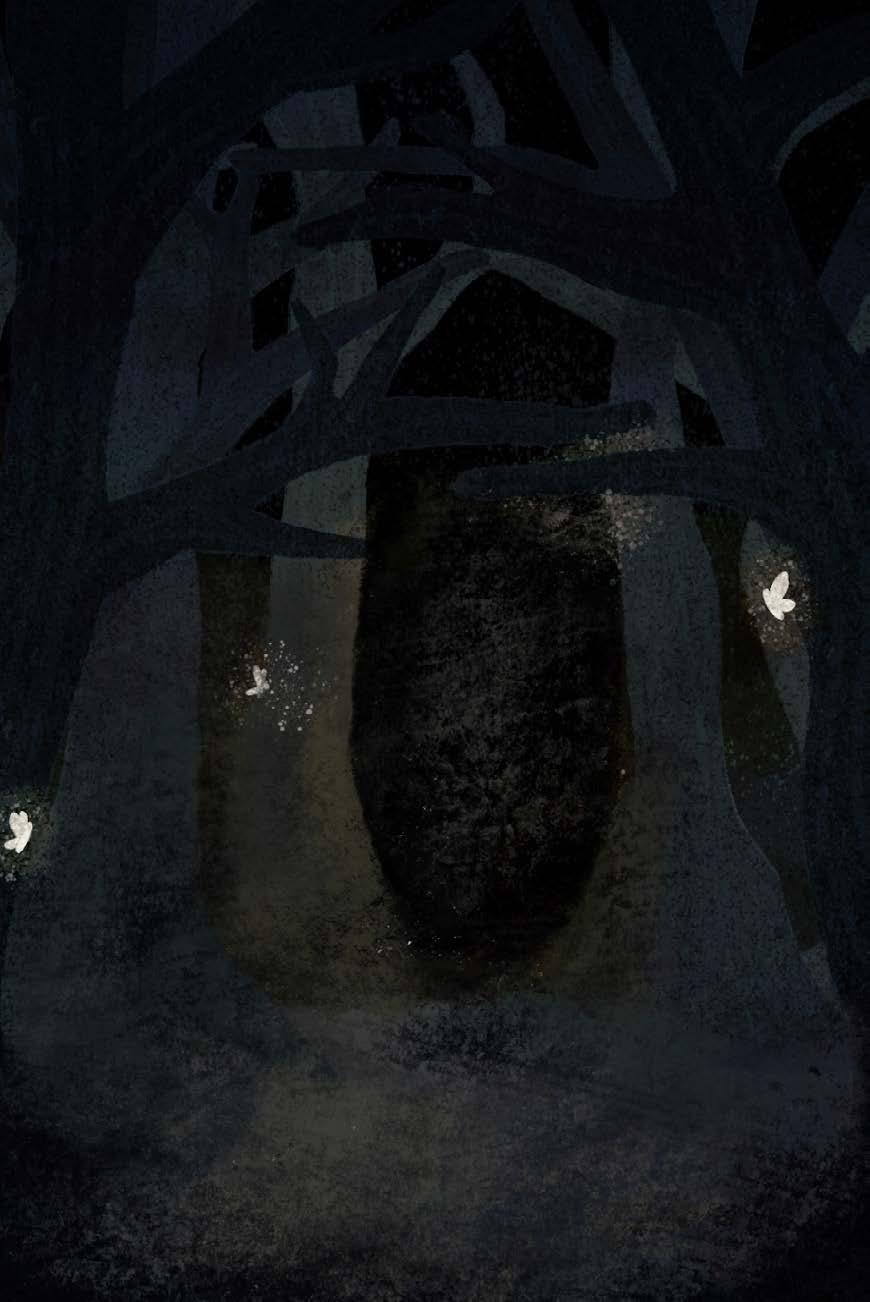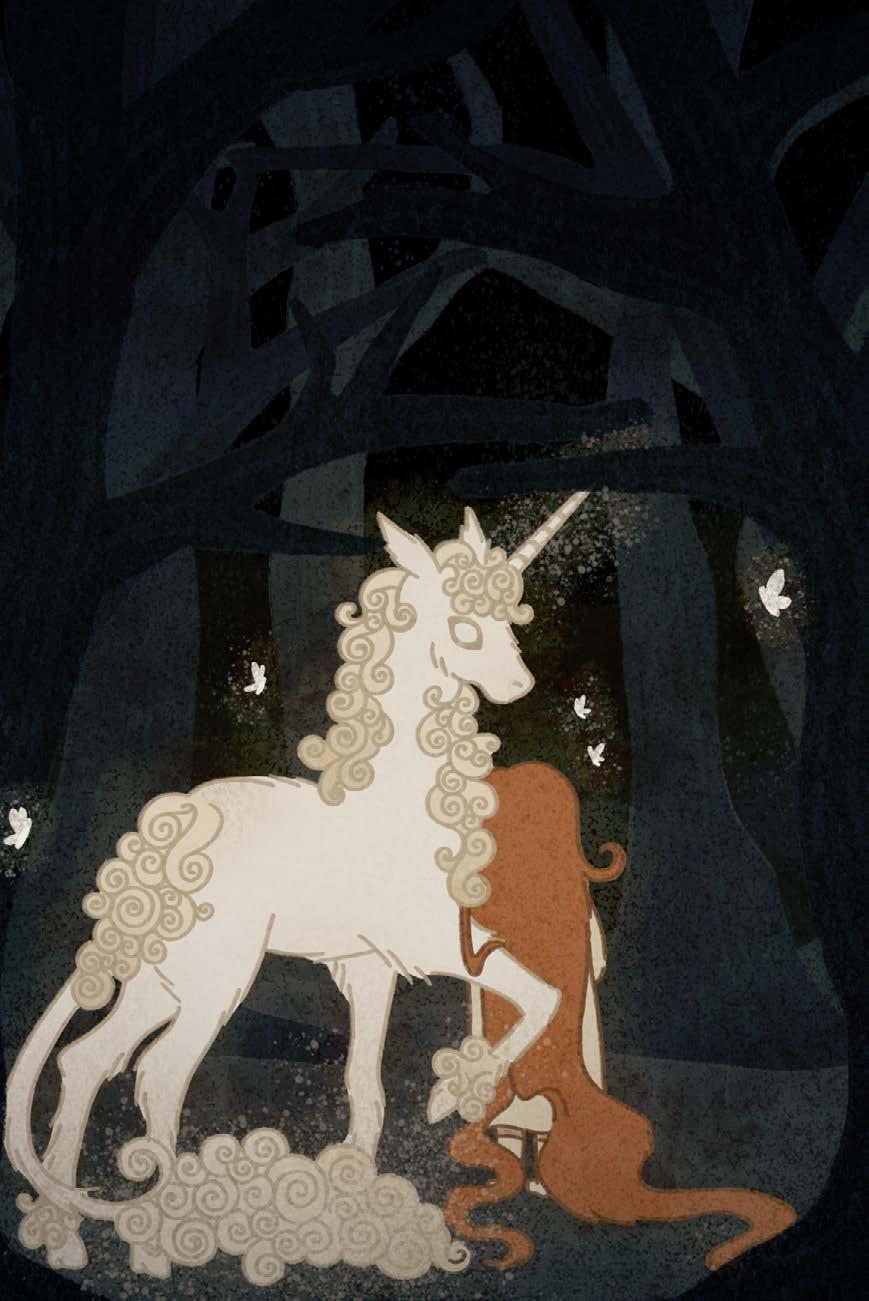

Review The
Florida
Can’t get enough? Read previous issues on our website at: https://kudzureviewfsu.
We want to see you in the next issue! Visit our submissions page for important deadlines and details on how to submit.





The Kudzu Review is produced with the involvement of Sigma Tau Delta chapter members.
The views and ideas expressed in the contained works do not refl ect those of the Kudzu Staff or the Florida State University Department of English. All rights revert back to their original owners upon publication. The Kudzu Review is funded in part by the Student Government Association and is a Recognized Student Organization at Florida State University.
Bobbi Corum | Martina Chadwell |
Howard Bucklin | Matt Hoofnagle
Thank You to our Donors!
Dear Reader,
Though there are thousands of words spread across these pages, it is impossible to convey with brevity all that occurs in the space between these lines. Each issue astounds me more than the last; this publication in particular has been a loaded one.
Letter from the EIC
This is my second and final issue as editor-in-chief and I am beyond grateful for all that this publication has given me. This year, and this semester especially, was a special one. Dare I say it, and dare I give myself the credit, perhaps Kudzu’s best. This publication has thrived under the care of a dedicated and hardworking staff, a staff whose loyalty to Kudzu has inspired me beyond measure. It comforts me to know that this publication will be left in good hands.
I would like to extend a special thanks to my masthead. To my faculty advisor and managing editor, Olivia Sokolowski and Rhubi Henderson. To my editors, Sarah Lerner, Cherith King, Dana Liberto, Marlee Gaitanis, Isa Hoofnagle, Luciana Callegari, Tessa Mahurin, and Miyah Lebofsky. To my layout editor, Ana Guardado. To my publicity director, Sydney Barrow. To my treasurer, Marlee Gaitanis. To my event coordinator, Gabriella Mola. And lastly, to my editorial assistants, for giving yourselves to this magazine, and for supporting Kudzu beyond the walls of the Williams Building, I am forever in your debt. Thank you for your dedication to your craft and the care you have put into these pages. A special thank you to my donors, for extending their generosity to passionate undergraduates.
This year has been a doozy! I cannot express my gratitude enough. We were able to collaborate and work with other organizations on campus and foster the creative and literary environment I have always dreamed of. We were gracious enough to host lectures with accredited authors, Kiley Reid and André Aciman. Our reach has extended far across campus, giving this publication the recognition it deserves.
Your hands hold the fruits of our labor, can you feel the weight of the artistic talent and vision that lies within? Crafting and curating this issue has been a privilege, to be entrusted with art so near and dear to our undergraduate contributors. I am immensely thankful to have led this magazine. Kudzu is more than a publication, it is a community and a space for voices to be heard, a testament to the talent that flourishes at Florida State University.
I am one for dramatics, and this is my goodbye. I leave Kudzu knowing it will continue to thrive, inspire, and survive. To our readers, contributors, and supporters, thank you for believing in us. I hope you enjoy this issue.
All my best, Michelle Chadwell
to Survive the End of Winter”
POETRY
“The Boy from the Bayou”

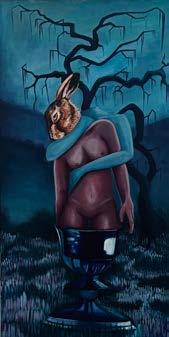

“Intergalactic Love” .
“Kite Strings” . . . . . . . . . 45.
“Consumption of the Hare”
“Portrait of Defense” . . . . . . . . . . . . . . 49.
54.
“I Can’t Stop Grinding my Teeth” .
“The Coziness”
“Self Portrait as a Doll” . .
“Sympathy for Time”
. 57.
. 53.
56.
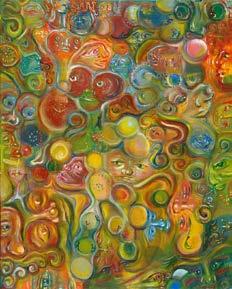
. 60.
. 61.
“Self-Adornment” . . . . . . . .64.
“Guidance of the Innocent” . . . . . . . . . . . . . . . . 65.

“Hallowed Joan”
How to Survive the End of Winter
By Isa Hoofnagle
amuel Rivera scrapes his windshield with an old Visa gift card he found in the glovebox.
Apparently, a window can freeze over in a half hour if it’s raining just the right amount, which, of course, it was. He really puts his back into the scraping, flinching at the plastic-on-glass screechy sound it makes. Texas winters are no joke, you know. Just because it gets hot doesn’t mean it doesn’t get damn cold. There’s ice under his fingernails, which burns, just a little. He shakes his hand off and stuffs it in his pocket. Today is bad. It’s only 4:30, but the sun is already half-way down, and the rain clouds make it feel like it’s the middle of the night. His whole body is heavy, like there are patches of snow sitting on his shoulders. It’s been months, and he hasn’t been able to shake that feeling. He catches himself in the windshield reflection: flat hair, baggy eyes. He looks tired. He is tired.
Sammy runs his fingers through his hair. He doesn’t much like winter, even on a good year. This is not a good year. It is not a good day. So, he’s throwing his shit in the trunk of his car and going to visit his sister.
It’s been a while. The last time they saw each other was a month after Dad’s funeral, when the sun was still setting at a decent hour. They had brunch on a Sunday. Mari got Eggs Benedict and held his hand from across the table. She told him it would get better, and almost sounded like she meant it. She looked about half-together, her brown eyes not entirely absent of their usual lightness. Sammy was dead on his feet. He slips on some ice on the concrete, barely avoiding punching his car’s side mirror clean off. He exhales. He thinks he’s maybe, probably cursed.
Sammy tries to be a good guy. He pays his taxes on time, goes to church on Christmas, calls his mother, tips waitstaff 20% on a teacher’s salary. By 7:00 a.m. every weekday, he’s in his classroom, staring at the clock and shuffling through his lesson plans as eight-year-olds slowly begin to trickle through the door with their giant backpacks. He stays
after and coaches the soccer team—boys and girls. He stays up late to cut holes in printer-paper to make sure his kids can swing the snowflake craft. It’s a higher calling, teaching. A noble profession. Something to write home about, despite the meager paychecks. He’s holding the future in his hands, making sure they know fractions and stuff. He loves it.
But Jesus, man. Sometimes, you just start to lose yourself. Elementary school’s a lot more red tape than you’d imagine, or maybe just as much red tape as you’d imagine. You want new books? Well, everyone else wants a bathroom that doesn’t have rats in it, so you’re gonna have to settle for the history texts that don’t have 9/11 in them yet, and you’re gonna have to do it even when your life is in shambles.
Today, for instance, on the topic of shambles, John Chesterfield Elementary tried to fire him.
They called him into the principal’s office in the middle of the school day, over the intercom. As of today, it has been three months since his dad died, and admin hasn’t seemed too thrilled about his staggeringly can’t-do attitude about it, at least according to Avery. They make no attempts to conceal their contempt.
“Mr. Rivera to the principal’s office,” chirped Rita from reception. All his second-graders oohed at him while he bumped Avery’s door with an elbow and told him to babysit the class.
Budget cuts, or something, is what the principal said, arms folded atop her desk. His behavior has been less than stellar, and the school doesn’t have money.
Sammy packed his things during lunch. He dug a cardboard box out from the back of a cupboard in the teacher’s lounge and stuffed it with his books and mugs and his family’s last Christmas card from his senior year of high school, Feliz Navidad printed on it in golden cursive.
He was already at maximum emotional capacity before this, all his processors otherwise occupied. He made room in the box for a plastic apple his mother had gotten him as a gift and a stack of Teacher Appreciation Day cards, not letting it sink in. Sammy’s never been particularly elastic. But it doesn’t matter in the end, because the keywords in this story are “tried to fire.”
Before the final bell even rang, Rita’s birdlike voice called him back to the office. He dutifully paused his lesson on homonyms, borrowed Avery again, and ran downstairs.
The school rehired him on the spot, with Principal Thomas yammering on about work ethic and kids these days. Sammy got the hell out of there before she could re-change her mind.
Afterwards, when the kids were headed for car-line, and Sammy
had started taking his stuff back out from the box, Avery ducked into his classroom.
“So,” he said, leaned up against the doorframe. “They fired you.”
“For a whole three and a half hours,” Sammy said, taking an empty flower pot from his box and setting it firmly on his desk.
“Wow,” said Avery, stretching out the “o.”
Sammy cut him off. “I’m gonna quit,” he said, dropping down a stack of books and straightening out the spines. Avery just tilted his head. In the right light, Avery Palmer sort of looks like a dog who asked a genie to make him human. You can imagine the flopped ear, the big blue eyes.
“You’re not,” he said.
Sammy sighed. He put a Rubix Cube in his desk drawer. “I’m not.”
Avery smiled. “How would the Chesterfield Tigers ever win the championship?” He said, placing his hand on his heart like a scandalized southern belle.
“First of all,” Sammy said, “Lions. You work here, you should know that. Second of all, they are extremely skilled as far as seven to nine-year-olds go, and they don’t need me to succeed.”
“Yeah, okay.” Avery crossed his arms, eyes tracing the ceiling and landing on Sammy.
“What are you doing tonight?” he asked, leaning further into the room.
“It’s Friday.” Sammy said, obviously. He jiggled the handle of a stuck drawer until it unstuck. “I’m going home and sleeping until the weekend is over.”
Avery looked down for a half-second, then back at him. “Right. If you wanted to—” he started, stopped. “Let me know if you need anything, man,” he said, shooting him two finger guns. Sammy nodded, and then he went home.
He managed an hour alone in his apartment watching TV until the sounds bouncing off the walls started to drive him crazy. He managed another fourteen minutes of ignoring the craziness before he gave in and started manically scraping the ice off of his car.
He calls Mari as he’s driving.
“I’m coming over,” he says, as soon as she picks up.
“Hi, Samuel,” she says, falsely bright. “How is it going with you, dear brother?”
“Whatever,” he says, “I’m twenty minutes out.”
“Oh, I’m lovely, thank you for asking.”
“Bye,” he says, and jams his thumb on the ‘end call’ button. He
misses flip-phones. He misses landlines. He misses being able to mash a button when the spirit called you.
The roads are icy, but through an abundance of caution and the city’s semi-stable infrastructure, he doesn’t die on the way over. When he gets to Mari’s house, she’s waiting at the door. She has cute little winter decorations up, a metal snowman smiling cutely on the porch. She lets him in, standing on her tiptoes to ruffle up his hair. Danny and Ava, small and eager, slam into his legs as soon as he’s out of the cold. “Uncle Sammy,” Danny babbles. “Look at my drawing!” shouts Ava.
It’s a blur of “Have you seen my toy car?” and “It’s red!” and “Look, look, look, look!” It melts him, a little, the cacophony of noise. He hugs his niece, then hugs his nephew. It’s nice to just be Uncle Sammy, to be Mari’s baby brother. It’s nice to be sometimes defined by the people who love you.
He hangs his coat and his scarf, and kicks off his shoes. Mari ushers him into the kitchen, yellow lights humming from their place in the ceiling. “Emma’s working late today, so you’re stuck with me.”
“Luckily,” he says, “I came here to hang out with you.”
Mari gives him a look. She puts a handful of baby carrots on a plate and a little tub of clearly homemade hummus on the side, sliding it on the counter between them. He pops one in his mouth.
“So,” she leans her elbow on the counter, “what’s wrong?” she asks, the second he’s unable to respond. He chews, swallows, and pauses for dramatic effect.
“I got fired today.”
“What?” she drops the carrot she’s holding on the counter. Behind him, Danny drags Ava across the tile floor on a blanket, and they cheer.
“It’s fine, they rehired me before the day even ended,” he rubs at his eyes.
“That’s not fine, Sammy,” she points a finger at him. “That’s psychotic. They’re playing mind games.”
“Maybe,” he shrugs. “But I’m not unemployed.”
“Did they say why?”
“Budget cuts.”
She laughs, sort of dryly. He likes it when she gets like this, sharp and vindictive. When he was fourteen and she was eighteen, she keyed the car of the girl who dumped him on prom night, and stuck his boutonniere into the windshield wiper. She has a similar look in her eyes now as she did then. “How much more can they cut the budget?”
“I don’t know, but admin’s trying to figure it out.”
The thing about public school is that it truly is a numbers game. The principal who runs the school’s budget is old and jaded. She divvies out money to the sports teams and the drama clubs and the marching bands—all the things that make the kids happy—but you’ve got to cut off the parts of a body that don’t work anymore. For half a day, he guesses she thought he was one of them.
“That’s terrible,” says Mari, then points her carrot toward the hall and shouts, “Danny, put your sister down!” Danny does. She returns her attention. “Why you?”
He gives a wry grin, “I don’t think I’ve been chipper enough for them as of late.”
“They only gave you two days off for the funeral, and they want you to be chipper?”
He throws his hands up. “Kids don’t want sad teachers.”
“Your second graders don’t want teachers who aren’t you.”
“Maybe. But it doesn’t matter. I’m rehired and all is right with the world.”
“Then why are you here, eating my carrots?” She asks, not unkindly. “You look tired, Sammy.”
He deflates a little.
Once, when Sammy was seven, he ate total shit while riding his bike down the hill at the end of their street. Mari scooped him up off the concrete and bandaged his elbows and knees back together. It was the beginning of a lifelong commitment.
Whenever he messed up, she always bailed him out. She fluffed up his bed when he snuck out the window as a rebel teen, and cooked him dinner when he got home from soccer practice late enough for everyone else to already be asleep. He doesn’t know what he’d do without her. He hardly knows what to do now, while he has her serving him baby carrots at her kitchen island.
“You should’ve taken some time off, Sam. This is killing you.”
He’s shaking his head before she’s done talking. “I couldn’t. There’s a sub shortage. Those kids need me.”
“Your father died.”
“Our father. And you still showed up for work.”
“That’s different.”
He gives her a hard look. “How?”
She returns it in full. “Because I have people. I have Emma and the kids, people who have nothing else to do in the world but love me.”
“And I’m alone,” he says, all heat.
“Yes,” she says, somehow not sounding like an asshole. It’s a
skill she has, imbuing empathy into every knife. “You are. You have me, always. But you don’t have anyone else, and I can see it’s hurting you.”
“Avery’s my friend.”
“He’s your coworker.”
“He’s my friend.”
“Fine. But two friends doesn’t make you not lonely,” she says, like ‘two wrongs don’t make a right.’ He doesn’t know how she manages to avoid sounding preachy when she’s dealing out generic, Hallmark-cardwisdom like that, but it’s probably because you can tell that she really, truly means it.
“Whatever.”
“You’re folding in on yourself. I don’t know how you can stand it.”
“Sometimes I can’t,” he admits, chewing on his thumbnail. “Sometimes I don’t think I can do it at all.”
“That’s normal.”
“You start open-heart surgeries with that level of confidence?”
She shrugs.
He starts laughing, startled. “That’s actually extremely frightening,” he says. “Incredibly frightening.”
“It’s not like it’s brain surgery,” Mari says, and starts laughing too.
It’s the first time in a while that he’s laughed. It’s not a great realization.
Sammy decided he wanted to be a teacher when he was in elementary school, and his teacher stayed an extra hour every day after her job was over to make sure he was caught up with the other students in English. He never even had to ask her for her help.
He has a student right now named Carla, a cute little girl with bangs and missing canines. She struggles with reading like he did. Last week, she read a whole Amelia Bedelia book front to back, and she was like a supernova for the rest of the school day. He understands the weight of that, he does. But it’s like there’s a sheet over his head stopping him from really seeing it.
It’s really hard to be a teacher. That’s an understatement. It’s really hard to be a teacher even when your life is going great. Don’t get him started on being a teacher when it’s not.
Mari’s laughter peters out, like a candle under a fan. She drops a hand on his shoulder, shaking him once, twice. “I’m never not going to worry about you, Sammy. You’re my brother.”
“I know.”
“Lean on me, okay? Frankly,” she says, hand back on the table,
“lean on everyone. No one deserves it more than you.”
“I don’t know about that,” he says, resting his chin on his hand. Mari mirrors him, meeting his eyes.
“He was proud of you, you know,” she says, “So proud. Still would be.”
He tries to catch that and hold onto it.
He scrubs his hands over his face, tightness creeping into his throat. “Yeah, I know.”
Sammy wants to stop sinking. He just doesn’t know how.
“Fine,” she concedes. He watches her shift gears, adding an awkward but merciful, “Do you hang out with Avery outside of school? I thought you were allergic to making friends.”
“Now you’re just being mean.”
“Yeah. I am.” She throws a carrot at his head. “Any friendship hives, though? Stuffy nose? I am a doctor, after all.”
“Shut up.”
In his classroom, there’s a picture on his desk, newly returned, of his four-year-old self on his father’s shoulders, reaching up like he’s trying to grab the sky with his tiny baby fist.
Three months since the funeral and counting. Everything is still upside down.
Samuel Rivera didn’t get fired today. It’s a pretty low bar, as far as bars go. He wants to keep stepping over it.
His drive home is lonely. Twenty minutes, one set of headlights, open, empty road. It’s started raining again, and it’s dreary. He feels better, marginally, which was the whole point of going to Mari’s in the first place. He’s still not as cheerful as admin would like him to be, but he’s got his feet on the ground again. His radio is jankily croaking out pop hits for him and the moon and the clouds.
There are eleven minutes of vacant movement, of the sort of driving you do when your brain is busy and your body is on autopilot, and every once in a while you clock back in and remember you’re a bunch of flesh and bone traveling at 65 miles per hour. At minute twelve, Sammy is eight minutes from home, and his car skids off the road.
His tires lose all friction. Patch of ice, invisible. He takes back everything he said about the city’s infrastructure. He slams his brakes, and thinks oh my God. And then he thinks a dozen other things, fast fast fast.
His mother’s favorite flowers are tulips. All the crayons that little Tommy B. eats are red because he thinks they’ll be cherry flavored. The first R-rated movie he ever watched was Die Hard, and it made Mari cry. Avery bought him a flower pot for his birthday, and a little bag of seeds.
He forgot to plant them.
Quick as flesh and bone and 65 miles per hour.
At the funeral, his Tia gave a speech about tomatoes, and it made no damn sense at all. The teacher who saved him was named Mrs. Martinez. She had brown hair and blue eyes and she was the nicest woman he’d ever met. His tires screech. He can’t remember if you’re supposed to turn the wheel or not. In the hospital, his father only ate Jell-O. He refused everything else, just lime-green Jell-O. They all told him it was nasty, and he laughed and laughed. Heart monitor beep-beepbeeping. “I’m 83, mijo, I’ve lived a good life. A long life.” The car slows. The day his father died, he slept in his childhood bedroom, and his clothes still smelled like hospital.
The car stops.
When Sammy was eight, he went to a baseball game with his dad. He was never a sports kid, more of a comic books and bedroom kind of guy. He wasn’t social, he wasn’t agile, and he wasn’t interested in activities where there was no AC. But he could always tell his dad was bummed about his disinterest. Not disappointed exactly, but bummed. So, eightyear-old Sammy, moved by pity or shame or love, shelved Batman for the day, and went with his dad to watch baseball.
He found the game dreadfully boring. Too much standing around. The Astros and the Orioles had remarkably similar colors, which was very confusing to him. But he liked the big food and the yelling. He liked the way his dad would stick his fingers in his mouth and whistle like a bird. In inning six or seven or something, a foul ball rocketed its way towards their section. Sammy, in a move no one anticipated, dropped his cotton candy and dove for it.
He missed it spectacularly. Actually, he slammed the ball with a bent wrist and bruised the hell out of his arm, scraping his knees on the stadium’s concrete stairs. They didn’t even get to keep it; some grouchy old lady scooped it off the ground in front of him. But his dad pulled him up, dusted him off, and went crazy. For the rest of the week, he called him “Baby Babe Ruth,” and clapped his shoulders when they passed each other in the hallway.
He and his father were very different people. Sammy’s been thinking about it for months, all the ways that they’re different. His father was braver than he is. His father was stronger than he is. Sammy sometimes feels remarkably soft and pliable. He doesn’t think his father ever felt like that.
Sammy’s hands are white on the wheel, holding it straight, his foot hard on the brake. He’s neatly tucked in the shoulder of the highway,
heaving. He turns on his hazards. It’s been probably twelve seconds. His heart is trying to break through his ribs and out the front of his chest. Oh my God, he thinks. Holy shit.
Look, he knows that his father was proud of him. Good fathers are always proud of their kids. But he doesn’t know that he’s earned it. He wants to start earning it.
Sammy fumbles for his phone, hands shaking.
It rings twice before Avery picks up.
“Sammy?” He sounds tired, probably because it’s 11:00 PM and he’s a third grade teacher and third grade teachers are always tired.
“Hey, man,” he feels breathless, urgent. It’s like when you remember something you lost at two in the morning, and you tear up your room even though it’s dark out and you have work tomorrow.
“Are you okay?” Avery says. Sammy can imagine him frowning. “You sound weird.”
“Yeah,” he says. “I’m alright, I’m fine. What were you gonna ask me earlier?”
“What?”
It’s important, all of a sudden, to know what he isn’t doing with his life. He sees Avery in his classroom, big blue eyes, scratching the back of his neck and not asking Sammy a question. He makes a mental note to plant the seeds in his flowerpot, and to send his mother tulips, and to research projects for eight-year-olds that involve lime-green Jell-O.
“In my classroom today. You were gonna ask me something, and you didn’t.”
He’s been going at this all wrong. Going through the grief with his head down, instead of looking at it. You’re supposed to look at it. Lean on everyone, Mari said. He hasn’t even been leaning at all. He feels stupid. He feels a little bit like he’s going to throw up.
“Are you sure you’re okay?” Avery asks. “Your voice is shaking.”
“Yeah,” Sammy says, because he can’t say I almost just died and then carry on with normal conversation, even if it is a bit of an exaggeration. “All good. Earlier?”
Avery pauses. “I was gonna ask if you wanted to get drinks this weekend—”
Sammy cuts him off in the middle of his sentence. “Yes.”
“—obviously no pressure or anyth—oh. Really?”
He grins. “Really.” He exhales, shakily. “Avery, I’m not gonna quit.”
“Yeah, bud,” Avery says. Sammy can hear the smile in his voice, like he’s talking to one of his kids. “I feel like we covered that already.
Go Bears, yada yada.”
Sammy grins even wider. “Lions,” he says, and it’s suddenly hilarious.
“Same difference. Whatever. Thompson’s. Saturday, usually around eight. I’ll text you, okay?”
“Okay,” he says. “Okay. Thank you.”
“You’re weird, man,” Avery laughs. “I’ll see you there.”
The call beeps out, and Sammy is alone again. He rests his forehead against the wheel, accidentally honking the horn with his nose. It is still entirely possible that he is cursed. But, winter is almost over.
When he looks out the window, the rain has stopped.
Adam
By Molly Stinson
dam told me he could change the world. In fact, he bet me five dollars that he could. I was sitting criss-crossed on the floor in front of the old TV set when he said that, and I still remember knotting my fingers through the burgundy carpet and not listening to him. I knew I wasn’t allowed to have soda in the living room (and not during the school week, and never with caffeine), but Adam snuck a sixpack of Fanta over for me. He was my favorite babysitter, and after some weeks of complaining, my only babysitter. The Fanta was one of many reasons why. Unfortunately, though, I had done exactly what my mother said I would and spilled it across my brand-new uniform khakis and the carpet between my crossed legs.
Adam had grabbed fistfuls of paper towels and was dabbing at my clothes and the carpet intermittently, unsure which was more important, while I began to simmer in going-to-get-introuble anxiety, trying to figure out how to hide this new sin from my parents. The pattern of the carpet was doing its fair share of the work, but my soggy lap was undeniably stained, and as I sat and stared and wound my fingers tighter into the damp material around me, the tears began to fall.
“Oh, no, no, hey,” said Adam, desperately trying to placate me.
“It’s no big deal. We’ll change your pants. Don’t worry about it. We can hide it.” This didn’t help. I knew the carpet would inevitably dry and crust over, but my pants were stained, and neither one of us knew how to do a load of laundry. In hindsight, as much as I thought he was an adult, Adam was only nine years older than me, so spilled soda was probably still just as heinous of a crime for him as it was for me. Nine years isn’t a lot, but at fifteen and six, we were leading very different lives. He was driving a car and kissing girls, while I was crying for Band-Aids on the playground. I did a lot of crying back then.
Once the paper towels started to pill and disintegrate into the carpet, Adam stopped. The futility of his efforts sunk in.
“Oh, brother,” he muttered, and we were silent for a while, staring at my mess, until he ducked his head to look me in the eyes.
Here, I remember him.
Some people have little orange freckles, but his were dark like
the dust of peppercorn. His eyes were brown and green and always very earnest through a shaggy curtain of hair that fell onto his face. My private school required all boys to have short, neat cuts that would neither fall below the eyebrows nor touch the tops of the ears, so my shock blond was kept military tight against my head, leaving little privacy for my baby face. Adam’s hair fell whichever way it wanted to with little regard for St. Mary’s Catholic School code of conduct, nevermind that he went to the district public school. I thought he was just so cool. Like a greaser. Like a rocker. Like a rebel. Like a fifteen-year-old boy. This is how he’ll always look to me.
“Hey. Bet you five dollars I can change the world.”
The oddity and challenge of this statement surprised away my grief for a moment. “Start pulling your bills out now,” he had said, a lopsided grin growing across his face. It was the kind of grin that you hated and loved, a sort of eager arrogance. He took the glass from my sticky hand.
I can still see it when I close my eyes. Adam, standing upright and raising the drink as if toasting God, letting the living room light bounce off what was left of that sparkling orange ichor in the glass. He kept eye contact with me as he stepped away, eager for my reaction. There was a look of total triumph across his face as he poured the soda over his own chest.
To a six-year-old? God, he was cool.
“Ta-da.” He set the now-empty glass onto the kitchen counter. At least he had the foresight to step off the carpet. “World changed.” He held out an expectant hand for money that I didn’t have. When I shook my head, he just shrugged.
“I’ll get it later. Cool, though, right?”
I nodded. So cool.
When my parents got home, he admitted to bringing soda over (On a weekday? Adam, we told you this was against the rules) and that he had spilled it all over himself while pouring glasses for both of us in the kitchen (At least it didn’t have caffeine, thank God, or else he’d be up all night). My pants were collateral damage.
He didn’t get paid that week, but he made sure that I got him the money. It was in my mother’s purse, in the second drawer on the left of my father’s desk. When this wasn’t enough, there was always the glossy pink piggy bank that sat on top of my dresser. The stains came out of my pants by some miracle (dish soap and baking soda), and the only way anyone would know that something had happened to the carpet would be through one of us confessing. And we were never confessing. We were
partners in crime now. In it to the bitter, sticky end.
*
It was an email that invited me to the funeral. Forwarded from my mother to my business email, something I didn’t know she had. Attached was the worst picture of him I’d ever seen, and a link taking me to a website that told me I could Click HERE to Light a Candle and leave my favorite memory of the deceased. The website contained an obituary written in Calibri, double-spaced like a college essay.
I didn’t read it.
The funeral was scheduled for a Monday. It was inconvenient, to say the least.
I fought tooth and nail for my low-level software engineering position at this new startup company, well-funded by the parents of my twenty-something, baby-faced boss named Jared. Eight-hour days were spent debugging hundreds of lines of code and patiently explaining to Jared in our weekly “Tech Hangs” (progress brief meetings) that it may not be the safest idea (read: scam) to launch a cryptocurrency to raise funds instead of searching for legitimate investors. I’ve been assured by Jared that my consistency and the fact that I hadn’t quit when half the team revolted last week hinted at an upcoming promotion.
I took off the whole week.
Now, I’m driving ten under on the interstate, following the slow trek of rush hour commuters back into suburbia. It had poured a week ago, and the hills that came up on either side of me were wrinkled with erosion, and the furrows where the grass had slipped away made it look like the world had aged. I guess it had.
It had been almost a decade since I’d last seen Adam, and we hadn’t kept in contact. Things had only been told to me in passing, like that he’d gotten good work at the auto shop (work that was prefaced with “good” meant that the following job shouldn’t be commented on), that he moved out of his parents’ house and was real independent (he didn’t visit home), and that they think he had a girlfriend (he hadn’t gotten married yet).
I wonder if he heard similar things about me. That I’d studied tech on scholarship at a big muckety-muck school (ridicule my achievements to make others feel better), that I moved to be where the business was (that I didn’t visit home), and that they think I have a girlfriend (I hadn’t gotten married yet).
Traffic slowed to a crawl, and I unfocus my eyes against the steady stream of bumper-to-bumper LED headlights. I had the radio set to a public broadcasting station, and I was trying to let the drone of stuffy
academics fade my mind into static, but instead I rotated the memory of Adam in my head for an hour, simmering a dozen years of babysitting and brotherhood down to just a few standouts.
In my backyard, every summer, when the honeysuckle bloomed, we crowded around the bushes like bees and sucked the nectar from the base of the flowers with a desperation like we were starving. My father told me not to touch the flowers because they were invasive weeds that prevented things around them from growing and had been sprayed with pesticides just the week before (It’s going to knock years off the end of your life, young man).
“I’m older, so if anyone’s gonna get sick, it’s gonna be me.” Adam wasn’t worried at all. “You just watch me. If we get sick, I’ll get sick first. If that ever happens, I’ll take us both to the doctor right away, and they’ll fix you before you even look sick, promise.” He wasn’t scared, so I wasn’t scared.
“Plus,” he added between blossoms, “Ain’t no fun in the end of your life, either. Who cares whether you’re alive then? You’re gonna be old and wrinkled, and you can’t play anymore.” I nodded pensively. He was right.
He always was.
I would always beg him to tell me about the things he learned in school, until he told me the story of Laika the Space Dog and how they launched her into space knowing she would die. I sobbed on and off for a week, and once my parents found out why, Adam wasn’t allowed to tell me any more stories from school. The next time he came over to babysit me, he sat me down and held my hands and told me this:
“We’re all gonna lay in bed one night wishin’ we were able to do something important, Mikey. Most of us ain’t gonna be able to do all that. Laika did, and I bet she knew it. And I’ll bet she was happier than us ‘cause she knew it.” I didn’t believe him. His eyes were too sorry. I must have started crying again because he started laughing.
“Oh, brother.” He went and got the tissues.
This was how we lived, the two of us. I stressed, he lied his ass off. For me, for himself. I wouldn’t say it was compulsive. It was compulsory. He had developed a set of survival skills that were getting him through a life I had no understanding of-all the knock-down-drag-out fights that got left at the door with his shoes.
*
I meet my family in the parking lot of the funeral home. My mother is the first to spot me.
“Michael, come here,” she says, but she marches over to me in her
sensible mourner heels and takes to smoothing out the lapels of my professionally sad suit. It was a formal gesture, a final check of my appearance before we presented as a family. I look over her shoulder to see that my father and little sister have been subjected to a similar treatment. What hair my father had left had been greased down across his scalp, and Sarah’s black dress was cinched a bit too tight at the waist. As my mother moves on to straightening my tie, I watch my sister pick at her fingernails. I wonder why our parents brought her in the first place. She isn’t old enough to remember Adam. The idea that I should introduce her to him post-mortem makes me feel mildly ill.
Sarah scrunches up her nose at me. “What?”
I’m not sure how to respond, but my father does so for me.
“Be grateful to see your big brother,” he chides, “He’s very busy, so you should be grateful he came home to see you.”
She blows out air from puffed cheeks.“He didn’t come home for me.”
Our mother pinches her youngest on the arm. “That’s enough. Now is not the time. Michael,” she rounds on me again, “Why don’t you stay with us while you’re here? I’ve converted your bedroom into an office, but we still have the pull-out.”
“I paid for my hotel already,” I lie. “They don’t offer refunds. I should stay there.”
Our mother sighs and pulls out her phone to check her makeup one last time, trying to buff out crow’s feet with her fingers. “Let’s head inside, then.” I fall in line, and Sarah trails sourly behind me.
As I cross the threshold, our father claps me gently on the shoulder. “I don’t know how long you’re here for, but you should at least join us for breakfast one of these days.”
“Yeah,” I say, “I’ll try.” But I wasn’t sure if that was a lie, too.
They decided to bury Adam in a suit.
Looking down into the open casket, it was clear that he hadn’t worn a suit in a very long time. It looked wrong on his body, but everything is a little wrong when you’re looking at someone like that. He’s short. He was tall when I knew him, but he had stopped growing somewhere along the way. His eyes have been closed and his hair has been cut and styled. Above the brow, above the ears. The dark freckles that I remembered across his face had multiplied, joined by fine, sweet wrinkles around his eyes and at the corners of his mouth. How old was he again? Nine years older than my
twenty-six. Thirty-five. That wasn’t so big of a difference at all.
I am shuffled down the line of mourners so that others can come to similar conclusions.
I take my seat next to Sarah, who has refused to wait in line to ogle at Adam’s body. Gross, she had said, and gotten another pinch from our mother in response. She’s on her phone now, furiously texting friends I’ll probably never know.
Are you still a little sister when your older brother dies? I think you are. I think you have to stay a little sibling forever. I think even fortyyear-olds with big brothers and sisters are still little siblings, and I think you can tell. You can tell Sarah is a younger sibling because of the way all of her emotions have always shown on her face. She still has a baby-girl face with a soft, sloped nose and a forehead that wrinkles only when she frowns, but any day now, some of those wrinkles will start to set.
A pastor takes to the stage and silences any last murmurings of the crowd. He says a few standard things and reads some rambling passages from the book of Psalms. When Adam’s family takes to the stage, I listen closely to what they’re saying, trying to make sense of it all. If I had to guess, I’d say that Adam had been in and out of rehab for a while, and that they probably saw it coming.
I would have been eleven to his twenty. Years of babysitting had begun to dwindle, not by any change in Adam’s schedule, but because my father had gotten a promotion and my mother was able to quit her job and watch over me. I had spent the last few months hiding from her in my bedroom, because every time she found me reading or playing video games, she’d give me some job to do, come up with some hole that needed digging, find some baseboard that needed dusting. These new months ticked by slowly, and as she grew more and more pregnant, she became slower and easier to hide from. The last few months were particularly rough, and the walls of our cookie-cutter house were thin enough for me to hear her throwing up at night. I did everything I could to muffle the sound. It didn’t work. I hated the thing inside of her for all her pain and my discomfort, and even more so when I found out it was going to be a sister. A sister. I didn’t want a sister.
I got him again when my parents rushed off to the hospital in the middle of the summer with a promise to come back with a brand new baby girl. I’m too big for a babysitter, I remember fuming at the time. Though I believed myself to be well past troublemaking, they still didn’t trust me alone, likely due to years of sticky fingers—in both senses of the term.
The room was so quiet that I could hear the ticking of our old clock in the kitchen. It had been a year or so since I’d last seen him, enough to become too shy for eye contact. Instead, I snuck glances over the book I was pretending to read. Adam sat across from me in the living room, watching me, comfortably slouched on the couch like he’d never left. His hands were buried in the pockets of his jean jacket, and one combat-booted foot was thrown over the other leg. His hair was messy and even longer than I remembered, and fell over his left eye.
“You want a drink?”
I snuck another glance at him from behind the social shield of Harry Potter and the Sorcerer’s Stone, and he pulled a hand from the depths of one of his pockets, just enough for the metal screw top of a hip flask to peek out above the denim. I knew what it was from movies and TV shows. My father didn’t drink often—on holidays, maybe—and certainly never from a hip flask. Now, I stared at him.
“To celebrate your sister.”
“I don’t want to celebrate her.” I blurted the only thing I could find to say. I had always been the most honest with him. He laughed.
“That’s a terrible attitude. You need to lighten up.” He unscrewed the top of the silver bottle. “All the more reason for a drink.”
I watched him carefully now, Harry Potter long forgotten. His head leaned back and his throat bobbed slightly. When he looked back at me his hair had fallen away from his eye, revealing a dark, wine-colored ring.
“See, it’s not poisoned.” The bruise was yellowed along the edges. The corner, nearest to his nose, was a deep cherry red. The whites of his left eye were slightly pink, something I could see from even this distance. It was angry and ugly. He leaned forward to hand me the drink. His hair fell back into place.
The metal body of the flask was warm from his body heat, and the liquid inside was fiery and sharp and vile as it scorched its way down my esophagus. I coughed and coughed and handed it back to him, watching him take another sip through teary eyes before it was capped and replaced in his pocket. He tried to get me to take a little more, but I wasn’t interested after the first violent sip. The rest of the night was a blur—not from a drink I barely had but from a strange fear for the longhaired man in my house. He stayed on the couch all night, cross-legged and sipping from the flask in his pocket.
Sarah came into the world at just past 10 p.m. She came to me at just past midnight, the clatter of noise at the front door, the jingling of familiar keys, and the cries of something strange and new woke me
up from the couch. I caught a single glance at her—tightly wound red face, thick, pudgy hands waving angrily in the air. The tiniest pink, floral blanket wrapped snugly around the wailing baby. My mother smelled the alcohol on Adam almost instantly, and the mood changed rapidly from We’re sorry we took so long to Get the hell out of my house as voices began to rise. My mother had always been strict. It was for our own good. Even with a newborn in her arms, she wasn’t afraid to yell. I took the distraction as a chance to run upstairs, freed suddenly from the hypnosis of Adam’s presence. It was one million years, I remember thinking, until the final door was slammed and it quieted, and even once they had, Sarah’s cries continued. They continued all night. They continued for many years.
“Michael,” was the tentative try the next morning, “Would you like to meet your sister?”
I did not.
I never saw him again.
I spend the night at the hotel but make the drive to my childhood home early in the morning. I text my father on the way there, and he lets me know there’s enough food for me (as long as you don’t eat more than two eggs and a piece of toast). It looks the same as I remember: the same paint on the walls, same furniture in the living room. The TV was new, but the secret stain underneath the console was still there. It didn’t look like much had changed. I guess it hadn’t.
I sit in the same chair I always have, to the right of my mother’s, to the left of my father’s, both of whom have left for work, and across from Sarah, who was oversalting and peppering her scrambled eggs. Above her hangs our old light fixture, dark brass with four glass shades. She sits underneath the one that had to be replaced because Adam and I decided to shoot toy guns inside. The plastic bullet hit the one closest to the window and the glass shattered all across the table and he got yelled at. I know it’s the one above her because the others have been yellowed by time. That one is clearer.
“Sarah, how’s school going?”
She doesn’t look up at me. “Fine.” Somewhere outside, a dog barks. Sarah drowsily begins to jab at the eggs on her plate. “When are you going back?”
“Saturday.” That she looks up for.
“I thought you had an important career to get back to.” Now she points at me with her fork, accusatory. “Sounds like you’re slacking. Jared’s going to be disappointed in you.”
“I’m not slacking.” For once, my moron of a boss was the last thing on my mind. “Adam died.”
Sarah sighed. “Yeah, I know.”
I wish I had noticed sooner how deep the shadows under her eyes have grown. They look like mine—how mine used to, how mine still do. Beneath the feigned teenage apathy, there is some deeper, familiar loneliness. How long has it been since I last saw her?
The dog barks again, piercing this time, and much closer. The two of us jump, there’s a crash, and I look out the window in time to see some terrier mix dart across the backyard, its newly snapped leash flying behind it.
“Shit,” I hear Sarah whisper, “Shit shit shit, no…” She’d knocked her plate to the floor. The porcelain had cracked cleanly into three pieces, and the splattered carnage of eggs across the hardwood looked like cartoon guts. I abandon my own plate and kneel down on the floor with her, picking up shards of plate and yellow slop with my fingers. Sarah cradles two of the largest pieces in her lap. “She’s going to kill me,” she whimpers, and I look up at her.
Here, I’ll remember her.
Underneath dirty blonde hair wild from sleep, there is a distinction in her cheekbones that hadn’t been before. Had it been there yesterday? Her nose is sharper. Straight, not sloped. Her eyebrows have filled in and darkened, and they knit together in the center with one deep wrinkle. She looks like our mother. She looks like me. How old is she again? Eleven years younger than my twenty-six. Fifteen. That isn’t so big of a difference at all.
I take the plate from her hands, and she looks at me. She’s so little. She’s gotten so big. I give her my worst smile, the kind of smile that would make you mad to see.
Oh, brother.
“I’ll bet you five dollars I can change the world.”
PO ET RY
Sitzzwerg
Burke Weisner
Cherry trees melt like ice cream in the last days of May. I think of all the sweet songs I’ve heard, a new folk of dust in white teeth
Somewhere in the wings
Theres a German word to describe what I’m feeling Like Sitzzwerg which, upon consulting a dictionary, means a tall person who looks short when sitting down: It sounds like a dream on crutches falling down the stars
Everything stretches for something greater. The boy I knew who worked construction crews and sang saintly poems hiding under hotel awnings thinking he’s a Minnesotan Dylan Thomas. “Goodbye and remember me,” he said, “In the grey-green of an Irish summer or under the voyeur stars. Keep a part of me alive.” Then he left on a bus to somewhere he’d never seen.
Sometimes love burns in me so hot I’m not even there and my future glares so bright I could just vomit and all my steps are swings of a baseball bat striking out on invisible pitches.
We see a million lost things every day: leaves resting on the ground, a kid with a torn pocket letting his dull pennies roll away, or an old woman’s love letters lying in a dumpster— nobody will know that a boyfriend once wrote “I love you more than my favorite butterfly, the piercolias forsteri, and it’s fine that you can’t pronounce it, dear.” We are sometimes great but mostly just rust-orange refuse resting in the dirt.
Wind whirls the trees like a movie projector, but the theaters are all closed tonight.
White bulbs peek out between torn red and pink. I am choking on feathers. Her eyes are open and staring up at me, the wind rustles her plumage and I think, for a moment, that she is breathing. Her neck bones bared to the world, yet she breathes.
When I was young, I ate chocolate Easter bunnies, gummy bears, marshmallow peeps feet first, to let them retain their brain as long as possible.
Who chooses to gnaw the neck and let the plump breasts and thighs remain?
There is a hawk in the air, and a clawmarked hole in the ground by my feet.
A red sock in a washing machine of white. Her feathers are pink now. Remember Mike?
Who lived, headless, for eighteen months, fed by pipette in his killer’s hands?
Should the head be the first to go? To spare the suffering of sentience?
Use all the animal, waste none. I thought that waste was a human habit. But here I stand beside the open eyes of a chicken corpse, whole but for the skin of her neck.
Headless
Adelaide Gifford
Anthills
Caroline Lord
You don’t know about cruel summers until your skin’s been bathed in the July heat of a graveside service. A year has passed. I’m not waking from this dream.
He didn’t see his birthday, But I still keep living, 21, with an expired license, driving, to the DMV.
I check organ donor, on a desktop–didn’t think much into it at 16 didn’t think about dying young but lately, it seems such an easy thing to do–easy as a fire ant sting–
they always get me at gravesites when I’ve got sandals on my feet, and I always think about the day my skin burned with their venom, but I didn’t die back in late May of 2011 or something close to that at least.
I was jumping hay bales with the cousins shoulders coppered running ragged in the heat while our mamas canned tomatoes in mason jars, popping outside to check the commotion of our cow trough whirlpools, tarp slip n’ sliding with dawn soap, like sandpaper scraping our skin.
It was something like a flame like the static when your feet fall asleep like embers on ankles cutting into me, and standing in five gallon buckets of water couldn’t dim the heat– not benadryl or bleach rubbed onto my legs by my aunt.
I fell asleep on a cold couch watching something in black and white and woke to everything blue, blue like the ocean fading to black as it got deeper and deeper until I fell into concrete.
Epinephrine shot ice cold adrenalin and red white and blue American summer in the back of an ambulance, but I didn’t die, though my body tried to.
I ask myself such cruel questions, driving back from the DMV, hands shaking on the wheel past the pines, past the place where he met Jesus on a July Wednesday night– it seems like dying is any easy thing to do.
It seems like it could’ve been me, and a hundred times over it has been in dreams, my body laying to rest in heat that suffocates black dress, puffed sleeves, skin like a robin’s egg, daisies spreading across yellow cemetery grass, and fire ant hills taking the shape of the mountains in my mind.
The Boy from the Bayou
By Ashley Boudreaux
Before the house on Sawgrass there was the bayou the Spanish moss dripping from the cypress its knees creeping out of the marshy green a boy sitting on a dock
His crooked Cajun nose hidden under the brim of his hand-me-down boonie hat
A small bucket of crawfish resting near him waiting to bring in a redfish or a speck before the last hour of sunlight found its place of rest on the horizon
Before the move to Delaware there were the schooltime mornings when his mother would say Off like a herd of turtles in a dust storm and he would march down the road never once looking back
Baton Rouge laced in his tongue He would have been a true Boudreaux if not for the brains that conquered engineering LSU tigers and Gumbo yearbooks
his 1956 graduation
Before long distance trips to D.C. there was Gentlemen Prefer Blondes the nervous flutters of a blind date Meeting her roommate at the door patiently waiting for a brunette starlet the kindest soul he’d ever meet
Years later, their home would brim four children racing through the halls Piano ballads tracing the backdrop of baton twirls and drill charts A small white dog asleep in the midst of it all
Before family reunions at Orange Lake there was the empty nest Silence ringing through the walls Just a brunette starlet and a boy from the bayou staring down the rest of their lives
They couldn’t have prepared for the final phone calls with their parents the distances their children would travel from home and the new faces they’d return with A home replenished with sound
Before card games and retirement home there was the house on Sawgrass gumbo every Christmas Eve cousins arguing over monopoly pieces my grandfather’s voice echoing from the garage Off like a herd of turtles in a dust storm
When I tell him I love him in the beige washed living room and he says I know with a glint in his eyes I am reminded how he always said that he never knew how to be a grandfather despite years of evidence otherwise
Before three generations came to be there was a boy sitting on a dock
The bayou’s humid earth lingering in the air a sun dipping into the duckweed and a mother’s voice calling for a boy to come home for dinner
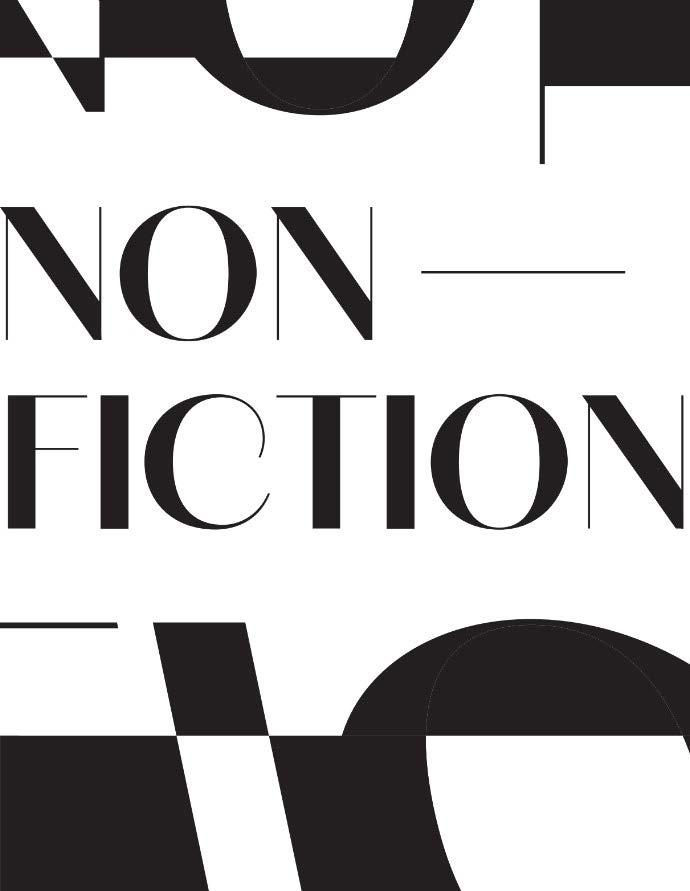
Èlǐsī Mó-jìng
By Isabella Kunze
Teasing a friend, telling him that if he wants to see his dad, he should just look in the mirror. A perfect reflection of his father, there is no question of succession. You realize as the words spill gaudily over your lips that you can too; see your parents in the mirror. That’s the only time you’ve ever seen them, actually. You don’t even know if you look like them, if you act like them, laugh like them, cry like them. Your friends have seen more of your parents than you have. On your face, in your eyes, between the creases of your smile.
Stare into the mirror. Look for them. Trace their nose, their mouth, their eyes. Find yourself staring at your friends and their parents, playing a game trying to learn the patterns. It’s nonsense, there’s no way you can predict what they look like. Don’t stop asking how much you look like them though. Is it vain to wonder if they are beautiful? If you are? If your body is a temple, then you worship by searching through old, young photos, staring at the smile that isn’t yours; lines of corrected teeth and framed by foreign hair. Always wondering what it would look like, this or that, never wanting to change it; you shouldn’t touch things that aren’t yours. Plain as possible, absence of artificial color is better than inaccuracy, continue searching for what they could look like. This? Or maybe this? Or maybe, nothing at all.
You’ve spent so much time staring into mirrors that it should be considered vanity. Your place is one of shame, next to Narcissus, kneeling over a reflective surface, searching. So much time spent staring into people’s eyes, looking only for your reflection that the original intention is lost. You think about them every morning as you brush your teeth and every night as you wash their-- your face. Is it theirs if they made it? Is it yours if you never really knew what to do with it? Like an all too busy wealthy man’s
boat. Surely they wouldn’t want you to waste it chewing your nails till they’re white and red, grinding teeth, seething at your rice as it turns over and over, burning in the pot.
Things to remind of the pair you have never met: cracking your knuckles, chewing your nails, pulling your eyelashes, combing your hair, licking your teeth, rolling your ankles. You will never escape the fact that everyone is in on the secret except you. Day after day they see them-- in your grimace as you think about the words strewn across the board. Everyone else can hear your parents as your laugh inappropriately echoes down the quiet halls, as your voice wobbles through a duet with people whose hair you want to run your fingers through, and as your chest shakes with anger bellowing at someone whose memories will always smell of lavender.
Do you think somewhere, they do the same? Do you think they look at old, young photos the same as you, looking for your face in the shadow of their own? Can you forget something like this the way you forget a quarter in the Aldi shopping cart? Not that you’d care… but if you did, care that is, would they like your hair? They’d tell you to stop chewing your nails, surely. Is it really seeing the past though if that thing was never there? Too afraid to admit it; the biggest fear is just barely missing them. Barreling down the hall towards the closing elevator doors and only thinking to call out as the doors ding and close. Just keep looking in the mirror; if you wait long enough, the smile lines forming like dripping water in a cave wall will carve a path, following your mother’s face.
Years of Running
By Kylee Minus
y father matched my pace, our running shoes hitting the road at the same time. He had taken me with him to buy new running shoes, which ended with the both of us leaving the store with fresh-smelling shoeboxes under our arms and smiles on our faces.
“Do what you’re comfortable with,” he reminded me. We had just started, and I already felt like I was dying. My lungs ached, my legs were heavy as stone, and no inhale of breath was enough.
I was eleven. It was the first time I ever connected with my dad. I couldn’t do this, I knew. I would start and give up, just like I did with everything else. I was no runner. Even so, I forced my legs to keep going.
….
“There’s this moment,” she said, “when your lungs burn. They burn so painfully, and I love it.”
I was thirteen. I nodded along as if I too loved the blaze. Loved the feeling of nausea in my throat, loved the burn when the sun was so hot, my skin prickled with cold. Her pale skin was still flushed pink, sweat coated along the rim of her forehead, cradled between flesh and blonde hair. I couldn’t get the image out of my head--her flying over hurdles like she wore the shoes of Hermes. Her legs were not much longer than mine, but somehow, she knew how to make them deliver her to the finish line faster.
I stretched over my leg, holding onto my right foot. I had been stretching for four hours to sprint a few meters. My fingers were stained with the black asphalt of the track. And I knew I would never run as fast as her. What did I love about running? Why did I run?
….
“Do you have an inhaler?”
Embarrassing. Yet, I was too busy trying to breathe to be too embarrassed. I shook my head the best I could, gasping in between wheezes. I tried to distract myself by glancing down at my watch.
It was a good time. A really good time. Maybe I would actually make varsity this year. Maybe I would make my dad proud. Maybe he wouldn’t have to wait until the end of every meet to watch me run. I was fifteen.
I had never wheezed before. At the same time, I don’t know if I had ever run so fast, felt so fatigued, so tired, so free.
“Take a deep breath. We’re almost done. Pump your legs,” she said, ever the upperclassman. Pump your legs. It was her favorite thing to say.
So, I did.
I took a deep breath. And I pumped my legs.
. . . .
“One more sprint, guys!”
I really loved my coach, but I swore if she made us run one more sprint, I think I was going to cry. (Not really. I never cried while running--I had cringed too many times passing sobbing girls during races to allow myself to cry. I used to play a game. Every night at dinner, I would tell my family which girl cried during practice that day—a ritual. A little mean-spirited, but anything to make me feel better about being slower than half of the girls).
We ran another sprint. The twinge in my foot was starting to become unbearable. Coach finally called it quits, but just as the team was starting to disperse, she caught my eyes and--
“Why are you limping?”
I heard the question, but pretended I didn’t.
There was no pain, I told myself. There was no way I was going to sit out another season because of a little injury. Not again. Not when I was so close this time.
….
“If you hadn’t gotten injured, you would’ve made varsity this year.”
Sometimes, I wish she never told me that. It’s one thing to be too slow. Some people just don’t have it in them to push past their body’s boundaries. Some people don’t know how to push past the terrible pain that running does to your body.
But I wasn’t one of those people. I knew how to push through. I knew how to be faster. Better. And I was so close. . . . .
The ghost of rain painted the road before me. My body was nothing but a vessel, a feather, a breeze. My feet took me over slick roads through dark tunnels of leaves and trees and rolling fields. I was sixteen or seventeen.
The short three mile run had already turned into five, and there was still electricity in my legs. There was a sweet familiarity in the fatigue. I felt like I could go forever, connected to the pavement, trapped in a rhythm of breathe in, breathe out, breathe in, breathe out . . .
Sometimes, I felt like I didn’t actually inhabit my body, like the real me was somewhere else. The one that everyone saw was a mirage, something I was borrowing, something I’d one day return. I felt claustrophobic under skin and fat and muscle.
But at that moment, I was in my body, and it was mine. All mine.
And as terribly cliche as it sounded, I was free. . . . .
My father matched my pace, our running shoes hitting the road at the same time. He and I had just picked out new shoes together.
“Do what you’re comfortable with,” he reminded me. Again. We had just started, and I already felt like I was dying. My lungs burned, my legs were heavy as stone, and no inhale of breath was enough.
I was eighteen.
The scene was painfully familiar. Starting over with the only sport I ever claimed to be good at. And yet, every time, I found myself back at square one with fresh new shoes and a pathetic pace.
I wish I could’ve bought a new pair of running shoes before leaving for college, but we didn’t get to it. My pair is stained by the black belt of a treadmill. When I call my parents at night, I tell my dad about the run I did that day. I am twenty, and it feels wrong to say that I am almost twenty-one, like the years somehow snuck up on me when I wasn’t looking, or like they had been running after me all this time.
“31:15 today.”
“I ran four miles today, Dad.”
“Finally got down to 30:15.”
“I want to come home.”
“What run should I do today, Dad?”
“Can I have new shoes for my birthday?”
“I love you, Dad.”
“9:30 pace today.”
By Mahalia Collingsworth
T Communion
he itchy fabric of the pew is rough against my back.
The priest’s voice is a molasses baritone- rich and slow as can be. I try not to fidget in my seat, thinking of the Sunday classes teaching us to sit still and the flowered headband my mother has pinned in my hair. My new white high heels shimmer on my feet, and if I’m honest, they were the only part of this whole tedious process I was all that excited about. I look up and down my row and confirm my suspicions- my shoes are the prettiest in the pew. I like the way they click when I walk down the long, echoey aisle of the church and the way they have me walking taller, even if they are only a child-appropriate church-acceptable height.
The priest is still talking, but something about confession catches my ear. I know from the Sunday classes, that’s the next step. Then I eat the bread and drink the wine and I have made communion and Mom and Dad will take us out for ice creammore as consolation than celebration. We file out of the pews, a sea of second grade white-clad bodies, and split into two lines to make our confessions. It isn’t like the usual confession, with just one priest in a box and the idea of privacy. There are two robed men in chairs, below the altar and to the sides, and we take turns going to them and speaking quietly.
They told us to think of something to confess before this, and the most recent fault on my mind was the stolen Junior Mints out of the driver side door compartment in Mom’s minivan. She never even knew I took them, but this was the first lie I remember telling and it weighed heavy on my chest. When it was my turn to bow before the Father and tell him my sin, the seated priest smiled almost imperceptibly, and his eyes crinkled in the corners like I said something funny. I knew in that moment that he thought he knew better than
me, all grown up and knowing about the worse things people confess. I could tell that he thought I was naive, confessing this slight like it was some real sin, unaware of what really matters. I knew about bad things. I had seen the movies. I had seen my teacher pull aside the boy I sat next to during reading time and ask him about his bruises. I knew about bad things, and I knew this priest thought I was so young that I had no concept of anything serious.
He thought I was cute and innocent and I could smell the patronization coming off of him in waves. Even at my little age, I was angry. He then nodded solemnly and reminded me it was wrong to lie, especially to a parent. I was struck then by the stupidity of this confession. I already knew it was wrong to lie. That’s why I was confessing it. Him reiterating my guilt did nothing to absolve me. He spoke slowly, like his words might be too heavy for me to understand. Adults think children don’t understand why they are laughed at, but they do. Children are just better at seeing the importance of the little things, carrying the weight of the insignificant. Adults get stretched out so tall and stuffed so full of condescension they don’t have room to remember how.
The forgetful priest told me my penance was a Hail Mary and the Lord’s Prayer. He reached into the little sack that hung off the back of his chair and drew out two cards, each with the words of the prayers printed on them. I took them then, but I already knew the words. Even when I didn’t know what they meant, I had always liked the shape of the repetition on my tongue and the triumph of getting to the end and not missing a single word. I liked the soft, tissue paper-like feeling of my great grandmother’s hands around a rosary as she repeated them, too.
So I said my prayers, proud that the priest would hear my perfect recitation, and I was forgiven. Just like that. Then I choked down the bread that tasted like cardboard and tried to let as little wine pass through my lips as possible and counted light fixtures until we were dismissed. Outside, the whole family took pictures with my lovely white dress and my brother told me about a dead snake he’d found in the garage while I was stuck in the hot church practicing the way we would walk up to
the altar. I climbed into my car seat, bolstered by the praise of my family and feeling like I had accomplished something. The whole way home, I kept my eyes pointedly away from the driver’s side door compartment. I had said my prayers. I was supposed to be washed of my sins. I knew it was a tiny crime, but it was thieving nonetheless. I knew better.
The priest, in his old age, had forgotten how to see things plainly. All things, even the little ones that become inconsequential with the more bad, grown-up things he saw. But I hadn’t. A memorized prayer, with the words written down in case you don’t even know them, and no feeling or understanding behind the shapes on your lips is not enough to make a bad choice go away. Even the small ones need to be made right. And you have to say it with your chest, like you really mean it.
But the priest hadn’t seen the lack of conviction in my eyes, blinded by my young voice and laughable innocence, so he couldn’t know that it meant nothing. I never told my mother, and I lied to her many times after that (casually, and convincingly) but I never felt that cool settling in my lungs that I imagined forgiveness from a priest might bring. It felt like an excuse, a cheap way out. A couple of already ingrained words and a superficial sorry.
Behold The Sun
By Caroline Eagan
ith each industrial revolution, the West marches closer to surrender. We’re on our third now, The Information Age they call it. And I hear my mother in my ear, telling me that once you put something on the internet it is there forever, and she doesn’t yet know that she’s promised me eternal life. Heaven exists for the beatified and the terminally online. And I sense there is something breathing and taking shape in the spaces between the moral fibers of the US, right where the satellite signals get in, and in moments of weakness I feel myself exhaling in unison. I know of veritable life that weaves itself between riverbeds and water towers, and it is a strange-looking child dancing in the ample grass. I know too of a simulacrum of the child; it is created by his mother from video of his exultation and given to the internet as performance, and he is called vile things that he can’t pronounce because of a missing front tooth, and he hinges slightly at the waist to wipe dirt off his knees. Such are the casualties in a burgeoning war of attrition, whose enemies are nebulous, whose foot soldiers are body cameras and Ring doorbells and post-9/11 intelligence affairs and all devices with a voice assistant and all apps with a search bar. In 50 years the CIA will declassify documents that will read like the Book of Revelation and in 50 more they will be understood as a suicide note.
I feel that I will spend a precious number of days dying of a disease which is not named and will not be named because there is no reason and no cure, and because it doesn’t truly exist anyway. Some neurotoxic byproduct of screen time and empathy catalyzed by depressants or stimulants or trans fats. I will search for relief and hole up with others who know that they too are dying of something great and unknowable—bigger than us and yet it found a way into
our bodies, imperceptibly small or maybe we lost something to make room. I will fall asleep in the shower and wake up when the water runs cold. I will chase my dragons through bar bathrooms with friends of friends. I will find an old picture of my dad and cry enough for both of us to feel it. Eventually I will die from my disease just as hair dies as it is pushed to the surface, soft and aimless. And finally, finally, at that very moment, I will let rigor mortis hold my mouth shut and my arms at my sides, I will learn the true meaning of business casual, and I will let the constant tide carry me into a life I don’t have to fight so hard for.
There is a great deal that I should tell you about unstoppable currents. For instance, my neighborhood in my hometown will be more or less underwater during every major storm by 2050, if not within the next 10 years. Two years ago, at the termination of August, Hurricane Idalia saw nearly half of our houses flooded. In late December I saw the fear. 1800-PACK-RAT and PODS waiting idly, presuming nothing. Idalia’s storm surge had destroyed the homes damned to sit at sea level. I can tell you that when a neighborhood is dying, it smells like rotting fish and feces and fields of mildew. You see its ribs protruding through houses burnt down to the frame. You see its bile in the stinking furniture eating holes in the lawns. My neighbor Bob started living in an RV in his driveway. He’s a lawyer and one of my mother’s best friends and briefly her colleague and one year she was preparing to be named partner at their law firm and the firm gave him the job instead and she quit after a decade of work. Bob always got a real kick out of maintaining a fire in his firepit, a big clay chiminea, constantly feeding it, watching it grow and spit, and Idalia carried it out to sea with her as punishment. Two blocks away my house sits on a hill; there but for the grace of God go I. The wealthier families have put their houses on stilts. If the problem threatens to enter through the front door, higher ground must be the solution. But what will be left of a neighborhood when all the houses sit above constant floodwater? The parks have no upward mobility, and then who will swim the dogs? Nobody was there to tell the first settlers not to place their societies on coastline. It is our instinct to follow what is beautiful and easy. Cardinal sin yields.
When I look to the Bible and the Great Flood and the ancient parallels, I find myself trying to parse warnings from the prophets. Something so clear that it was missed entirely, the exact spot the bird hits the window. In the Old Testament, the land of the dead is located beneath the ground amongst the coal and the oil, and it burns too. Still we brought the coal and the oil into our homes and were so blithely enjoying the warmth that we didn’t realize the death had come in also. It’s hard to say how obvious our fate was from the beginning; to burn with abandon and then be shocked by the heat seems ignorant. Maybe that’s an ignorant thing to say, an oversimplification of science. Truthfully, I don’t care to know about the science at all anymore. They talk on the news about irreversible things which I won’t or can’t accept. Divine intervention is my only method of repudiation. I’m losing my neighborhood and all I can think to do is look at the sky and wonder how far its Ozone skin is separated from Heaven, how much rain can fall from the rift between. And then I remember how John the Divine wrote about the apocalyptic sky, how the empty night will split apart, of a hole that will form in the layer above, and the body of the bird lies motionless under the back window.
I hold onto pieces of God wherever I can now, beautiful or funny or sad flashes interrupting the faithless dark. Days after writing this, I thought of Idalia again, of the name. I’d never seen it and couldn’t place it and felt bothered, neck deep in I don’t know you and yet here you are living in my house anger. This is where I tell you that I gave my computer a Wi-Fi connection and in return she showed me the Godhead. There, right there, below the Google logo and bolded so as not to miss it, a mommy blogger told me something hilariously, beautifully, terribly sad; “In Greek,” she wrote, “the name Idalia means Behold the Sun.” Maybe we just stopped looking for prophets.
By Kay Michelle
T Kite Strings
here is a field at El Morro in Old San Juan where the wind never stops. It isn’t the kind of field that stretches endlessly; it has an end, and it’s a steep, rocky one that drops into the Atlantic Ocean. But as a child, standing on that hill with a kite in my hand, it felt infinite. The grass there is tough, flattened by years of tourists laying out picnic blankets, children rolling down the slope, and elders sitting on folding chairs to catch the breeze. My great-grandmother, Nana, was one of them. She sat with her shoulders back, letting the wind tangle through her short strawberry blonde curls. Her green eyes, sharp and mischievous, flickered like sea glass catching the sun. She was always in motion even when still—fingers drumming on the arm of her chair, tapping a quiet rhythm only she could hear.
The field is alive in my memory, shifting with the wind that never ceases. It has its own intentions: to keep people grounded yet aware of the vastness beyond. It hums with the energy of the wind, whispering stories of those who’ve passed through, their laughter and longing carried away but never lost. The field doesn’t demand your attention; it offers itself quietly, like a companion who listens more than they speak. To my seven-year-old self, it was a universe of its own: open yet contained, wild yet peaceful. On that day, Nana and I took her old Toyota, a car that smelled faintly of lavender and cafecito. She sang songs wildly and unabashedly, her voice carrying notes I didn’t understand. They were in Spanish, foreign and rhythmic, so I made up my own words, mimicking her freedom without fully grasping it. When
we arrived, she opened the trunk and pulled out a bag with our kites, homemade from wooden dowels, string, and brightly colored plastic sheets that crinkled in the wind. Her hands, weathered and soft, tied the strings with the precision of someone who had lived many lives and mastered many small, perfect crafts.
The wind was waiting for us. I can’t recall a time that day when it wasn’t strong enough to lift the kites, tugging them skyward as if the air itself had been saving its energy for that moment. Nana held the kite’s frame steady as I unraveled the string, and then she let go. Watching the kite catch the wind and climb higher and higher felt like witnessing magic. I held the spool of string tightly, my small hands braced against the pull of the wind, and Nana stood behind me, her hands steadying mine. “Don’t let go,” she said. But a part of me wanted to—not out of carelessness but out of curiosity. I wondered how far the kite could go, whether it would disappear into the sky or if it would come back to us, tethered by that fragile string. She didn’t speak much that afternoon, but her presence was expansive, constant and grounding, even when it felt like everything else in my world might blow away. Her quiet strength made me feel safe in ways I didn’t yet have words for.
VISUAL
R

By Maile Hart
By Rebekah Winborn
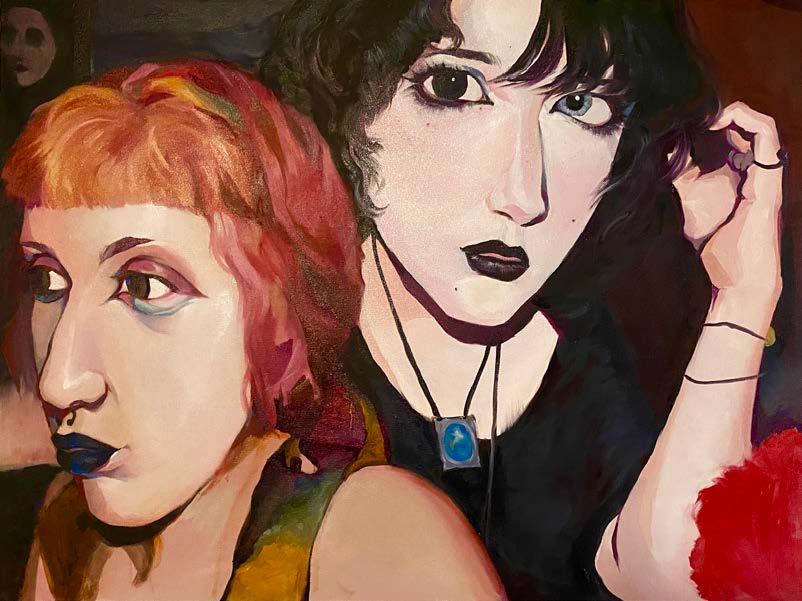
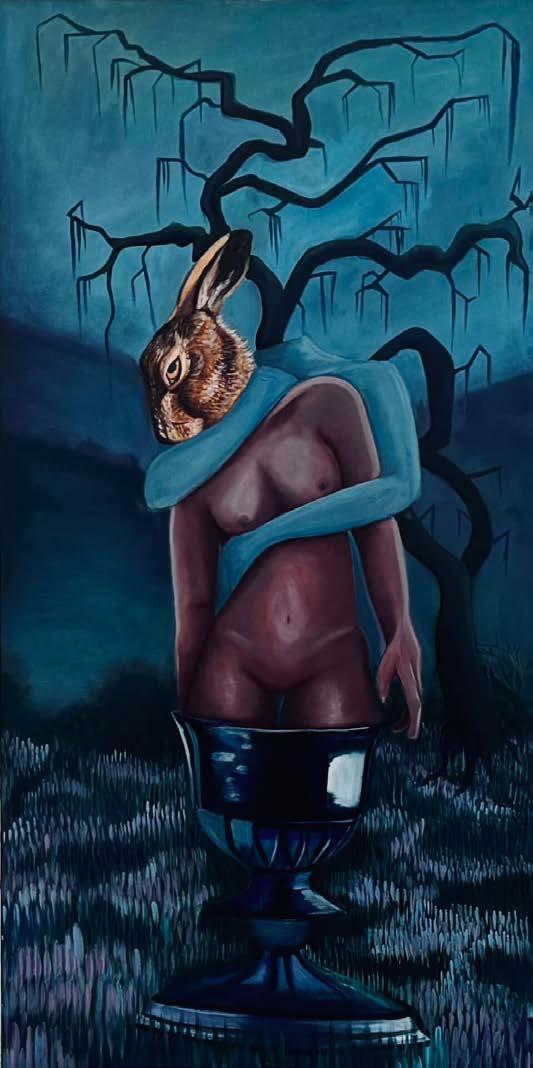
By Bella Lunel
I Can’t Stop
Grinding
my Teeth
By Maile Hart
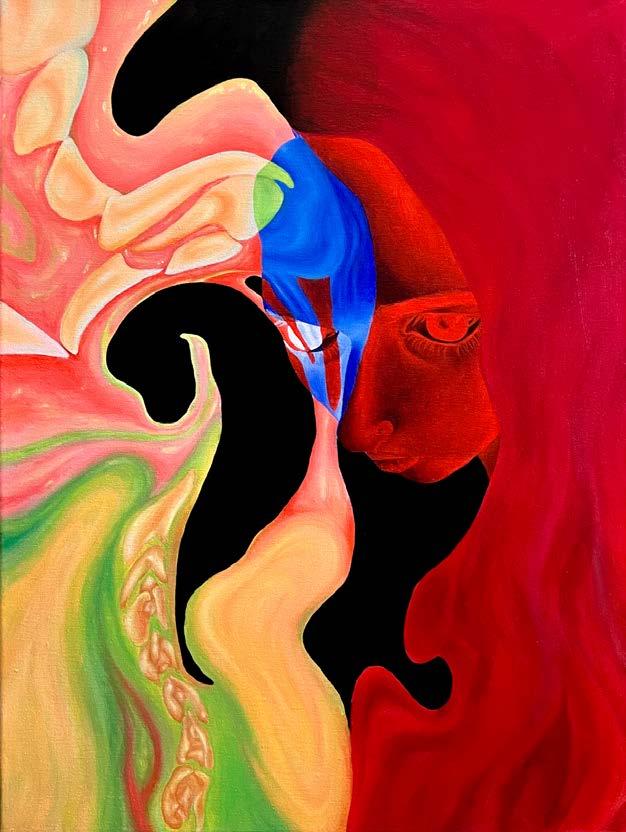
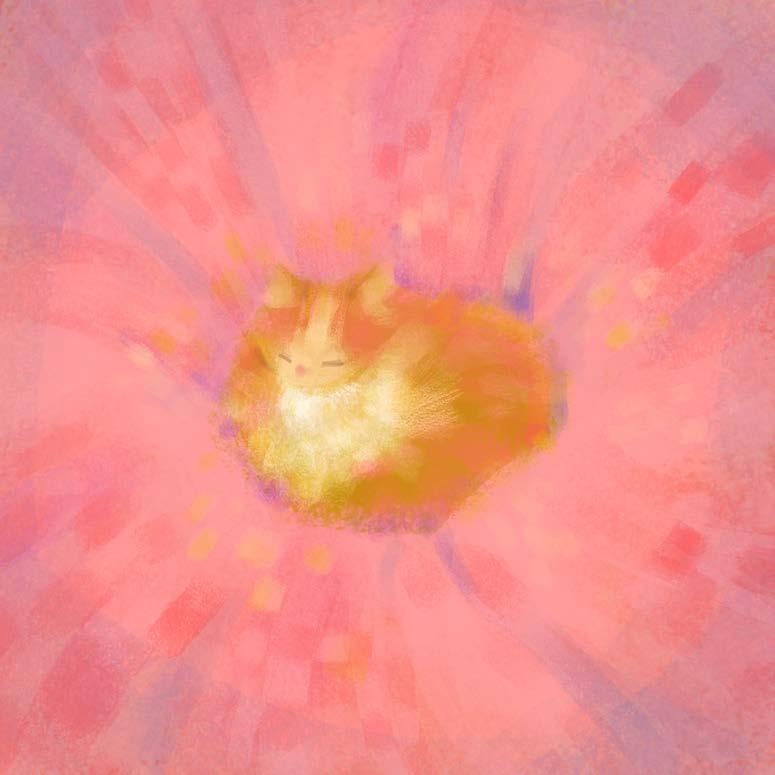
COZINESS
By Michiko Nishimoto-Rivera
Self
P rtrait
A
s a Doll
By Michiko Nishimoto-Rivera
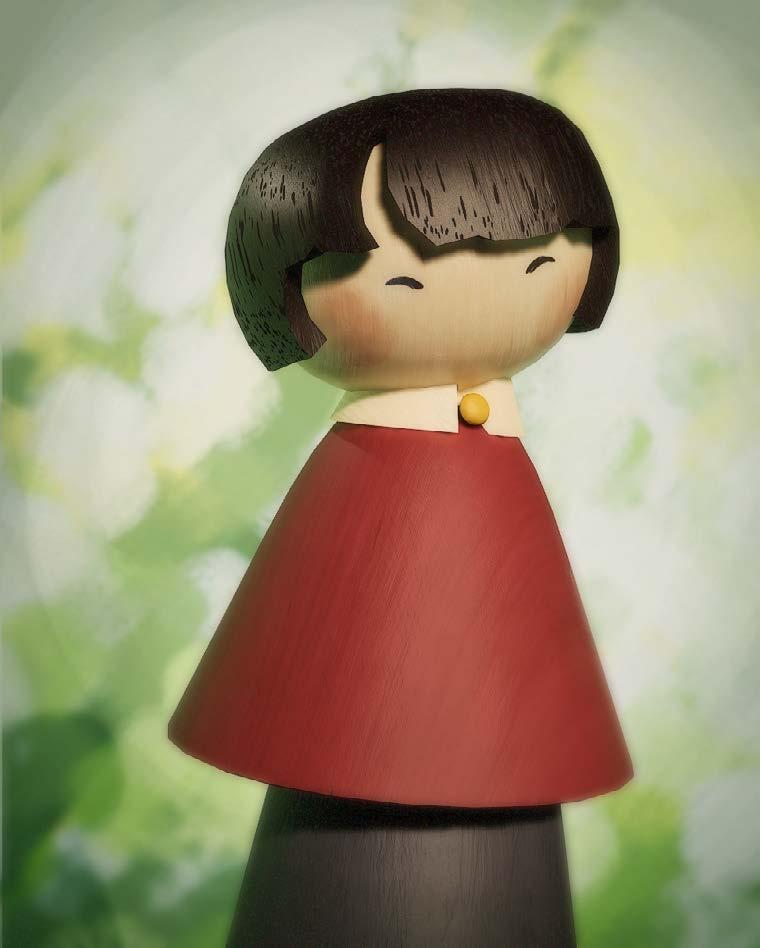
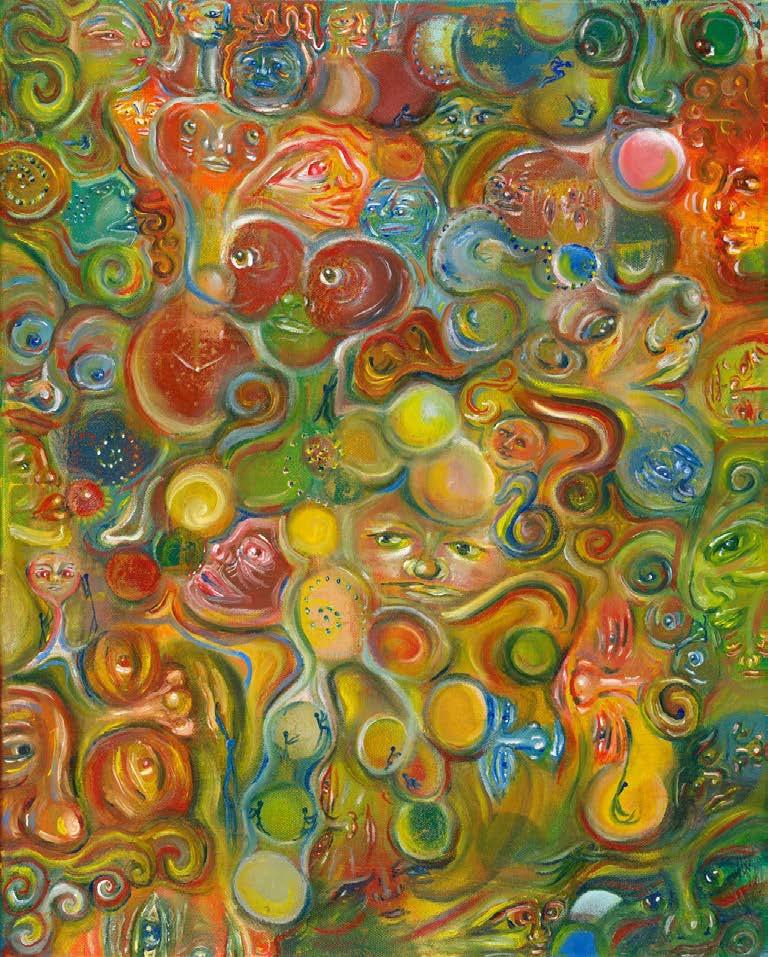
Sympathy Time For
By Sally Zarling
By Merium Qureshi
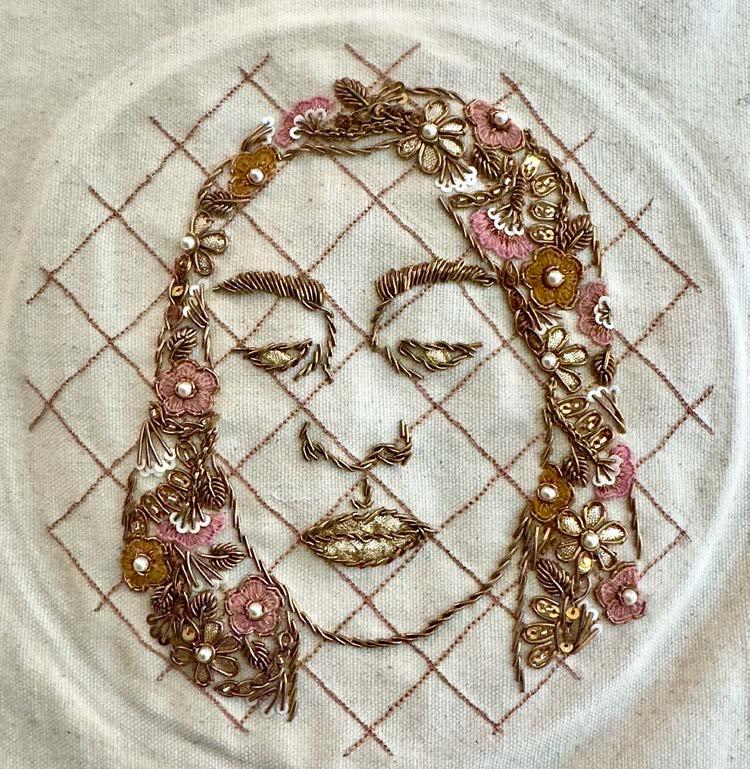
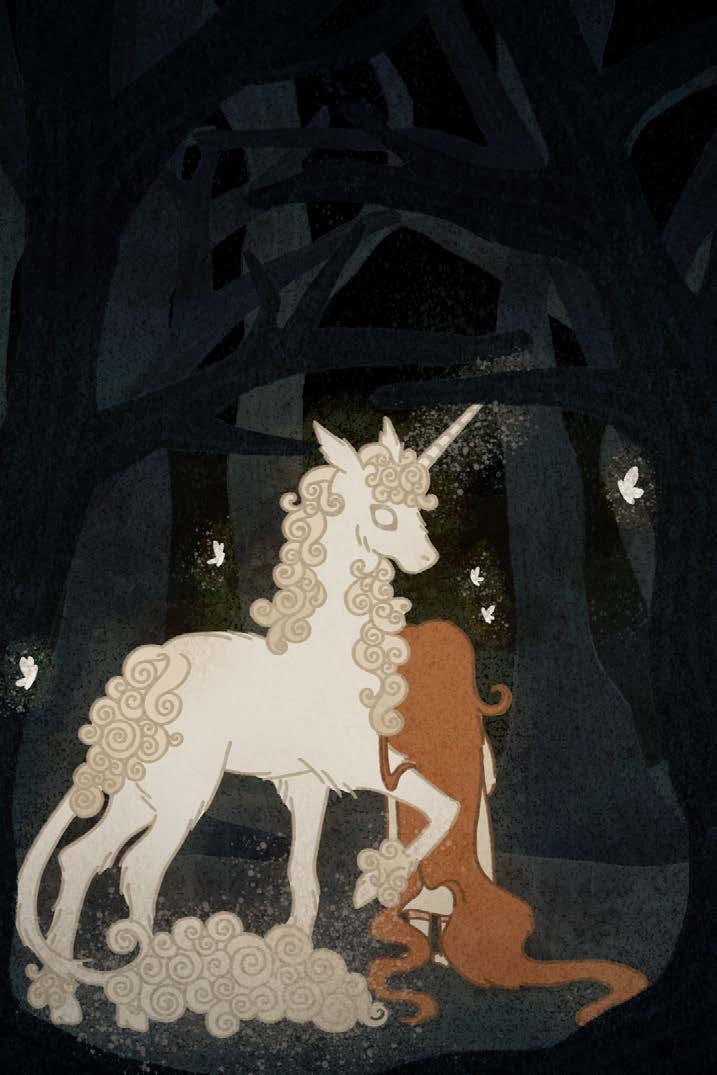
By Gwyn C
J O A N
By Bella Lunel
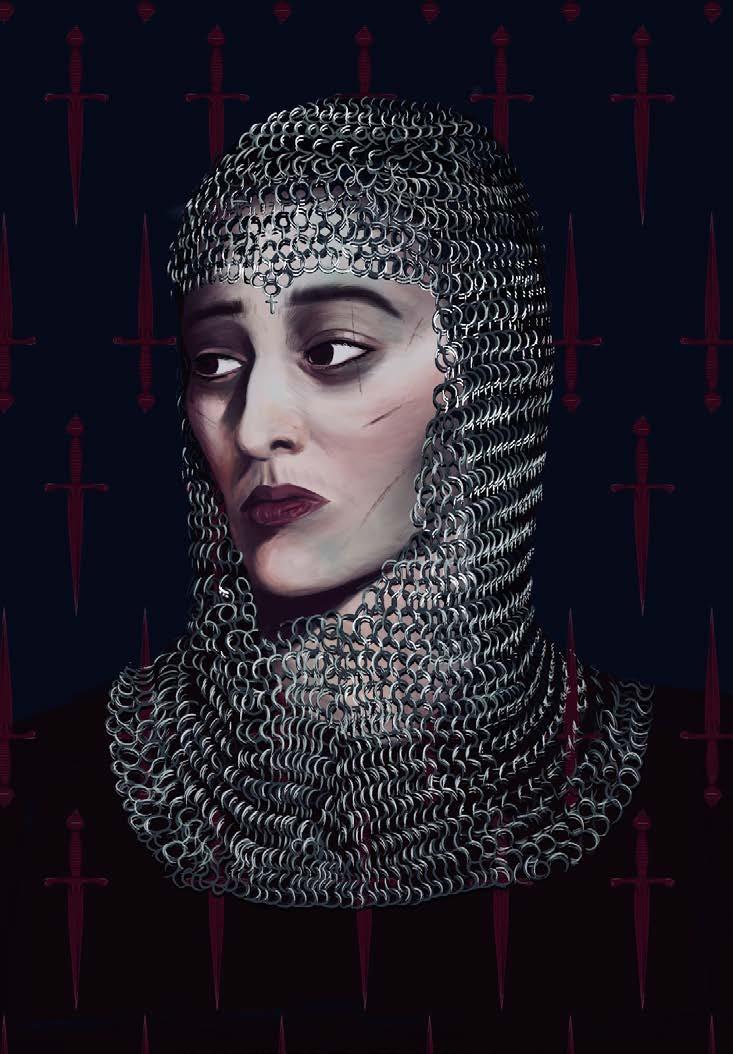
STAFF
FICTION
Sarah Lerner, CherithKing
Fiona Adair, Rachel Brady, John Brown
Daniella Cale, Samantha Getchell, Hannah Grinbank, Caprielle Grisham, Emily Harris, Alexander Ivy,
Aishat Lawal, Sophia Orozco, Kayla Perez-Fontaine, Emma Sofianos, Aubrey Tangen, Maria Tello
POETRY
Isa Hoofnagle, LucianaCallegari
Annabelle Argeles, Brianna Bonich, Blair Bowers
Veronica Fletcher, Savana Ford, Camryn Grimes
Isabella “Fallon” Herreno, Olivia Klimek, Madeline McCabe
Danielle McLemore, Ava Neill, Layne Roberts, Ada Rye, Luisa Santos, Emma Stanfield, Kylee Thomas
NON-FICTION
Dana Liberto, MarleeGaitanis
Lillian Allen, Joyce Bun, Salette Cambra, Antonella Craven, Noelle Day, Casey Drayer, Sarina Francis, Jonathan Garnes, Skylar German, Regan Gomersall, Madison Hillyer, Isabelle Krukoski, Maddison McCreary, Paola Perez Angelkos, Haley Quinn, Mia Rampersad, Sarah Reed
HEAD STAFF
Editor-In-Chief:MichelleChadwell
ManagingEditor:RhubiHenderson
Faculty Advisor: Olivia Sokolowski
Event Coordinator: Gabriella Mola
Treasurer: Marlee Gaitanis
VISUAL ART
Tessa Mahurin, MiyahLebofsky
Aurelia Aguila, Kirstan Davie, Maddalyn Duisberg, Lacey Fitzgerald, Kyra George, Sydney Graham, Cole Kasprzyk, Parker Keaton, Melina McGahey, Shogo Oviawe, Burke Weisner
LAYOUT
Ana Guardado
Clara Celedon, Veronica Escajeda, Fiona Froggett, Adalyn Pickett, Janet Weng
PR & MARKETING
Sydney Barrow
Logann Abramson, Anaya Aristhomene, Samuel Armesto, Anna Cheng, Sarah Duclos, Camille Friall, Amelie Galbraith, Brianna Johnson, Sraddha Karthik, David Levinson, Rylie Mayer, Mikaela Monzon, Imani Sameem, Mia Sweeney, Sophie Vital, Susana Zuluaga
LIST
